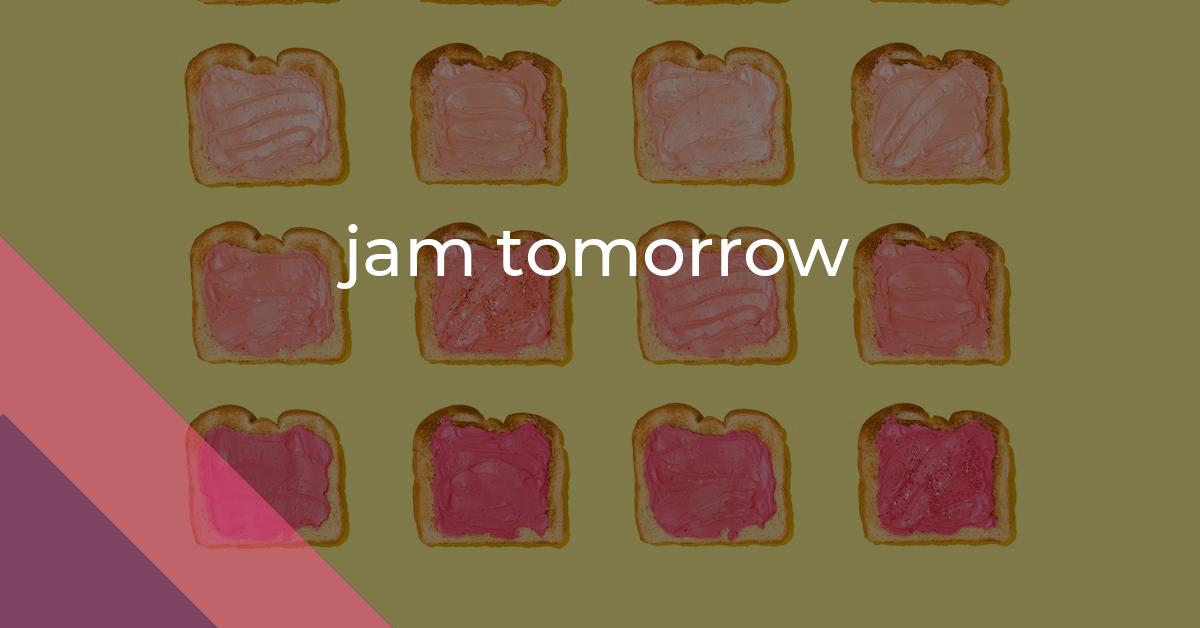jam tomorrow: Idiom Meaning and Origin
What does ‘jam tomorrow’ mean?
The idiom jam tomorrow refers to a promise of future rewards that never materialize. It symbolizes the disappointment of being offered something desirable in the future, but never actually receiving it.

Idiom Explorer
The idiom "money for jam" means easy money or a task that requires little effort but pays well.
The idiom "jam today" means the promise of immediate gratification or rewards that may not materialize in the future. It often implies the trade-off between short-term satisfaction and long-term gains.
The idiom "I wish" is used to express a desire for something that is unlikely or impossible to happen in reality. It enables people to communicate their hopes or dreams, often highlighting a contrast between what is desired and what is actually true.
The idiom "in your dreams" means that something is unlikely or impossible to happen in reality. It is often used as a dismissive response to indicate that someone's desire or suggestion is unrealistic.
The idiom "in one's wildest dreams" means beyond one's imagination or expectations, referring to something that is highly unlikely or unrealistic.
The idiom "in one's dreams" means that something is unlikely or impossible to happen. It is often used to dismiss someone's unrealistic or fanciful ideas.
The idiom "hurry up and wait" means to rush or be quick to do something, only to have to wait for a long time for the desired outcome or result. It reflects the frustrating and often futile nature of constantly being in a state of urgency followed by a period of inactivity.
The idiom "hope against hope" means to continue hoping for something despite there being little or no chance of it happening.
The idiom "go nowhere fast" means to make no progress or achieve no results despite putting in a lot of effort or time.
The Illusion of Tomorrow
The idiom "jam tomorrow" is a popular English expression that signifies the promise or expectation of good things in the future that ultimately never come to fruition. It is often used to describe a situation where an individual is led to believe that they will receive a reward or benefit down the road, but that future never arrives. One of the earliest instances of this idiom can be found in Lewis Carroll's book "Through the Looking-Glass, and What Alice Found There" which was published in 1871. In the book, the character White Queen tells Alice that she can believe "six impossible things before breakfast," one of which is having "jam every other day." The exact origins of the idiom are unclear, but it is believed to be a variation of the earlier phrase "jam yesterday and jam tomorrow, but never jam today." This phrase, also known as a "Pyrrhic promise," gained popularity in the mid-19th century and continued to be used in the early 20th century. The idiom conveys the concept of promises for future rewards that are constantly dangled in front of someone but are never fulfilled. The idiom "jam tomorrow" is most often used in a negative context to criticize empty promises, particularly in the realms of politics and business. It evokes a sense of skepticism and cynicism towards grandiose claims or assurances of future benefits. This idiom emphasizes the disappointment and frustration that can arise from repeatedly being told that good things are on the horizon, only to have those promises perpetually postponed or never actualized. Additionally, there are several related idioms that further exemplify the idea of unfulfilled promises or delayed rewards. Let's explore a few of them: 1. "Jam today": This idiom is used to contrast the promise of "jam tomorrow." It suggests that instead of waiting for future rewards, one should focus on and enjoy the benefits that are available in the present moment. It highlights the importance of appreciating what is immediately accessible rather than constantly yearning for the unknowable future. 2. "money for jam": This idiom refers to a situation where someone is able to easily earn money or gain some kind of benefit with minimal effort. It is similar to "jam tomorrow" in the sense that it alludes to the promise of a favorable outcome. However, "money for jam" implies that the reward is attainable and does not involve prolonged waiting or uncertainty. 3. "as if there were no tomorrow": This idiom is used to describe a situation where someone engages in reckless or extravagant behavior without considering the consequences. It suggests that the person is living in the present moment, disregarding any potential future problems or hardships. Although the phrase does not directly correlate with the idiom "jam tomorrow," it shares a theme of disregarding the future in favor of immediate gratification. 4. "Down the road": This idiom is commonly used to express the idea that something will happen in the future or in the long term. It can be seen as a more neutral version of "jam tomorrow" which doesn't carry the negative connotations associated with empty promises. "Down the road" acknowledges the concept of time passing and future events occurring, without explicitly guaranteeing any specific outcome. The idiom "jam tomorrow" conveys the promise of future rewards or benefits that are perpetually delayed or never realized. It reflects a sense of skepticism and disillusionment towards empty promises and unfulfilled expectations. Despite its unclear origins and early usage, the idiom remains relevant in contemporary discourse, highlighting the enduring human experience of dashed hopes and unfulfilled dreams. Rather than fixating on the elusive "jam tomorrow," it may be more fulfilling for individuals to appreciate the tangible benefits available in the present moment and pursue realistic aspirations for the future.
Example usage
Examples of how the idiom "jam tomorrow" can be used in a sentence:
- She always promises to pay me back, but it's just jam tomorrow.
- We keep working hard, hoping for promotion, but it feels like it's always jam tomorrow.
- Politicians often use the phrase "jam tomorrow" when making promises they may not fulfill.
More "Expectation" idioms



